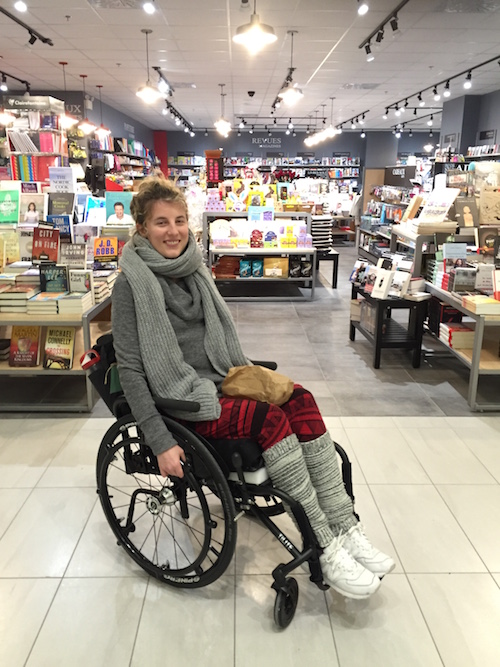
This photo of Stephanie Chipeur was taken in March 2016 (supplied).
After a devastating car accident while on holiday in 2014, Stephanie Chipeur could be forgiven for spending all her time focusing on her rehabilitation from her C5/C7 spinal cord injury. Instead, only a year-and-a-half later, the doctoral student at McGill University's Faculty of Law has used her experiences during rehabilitation to motivate researchers at the Faculty of Rehabilitation Medicine to focus on social inclusion as a mechanism of rehabilitation.
The Stephanie Chipeur Accessibility Research Fund will provide a one-time research grant to a faculty member to develop a research project that focuses on social justice as it relates to accessibility, visitability or universal design. Each project that is selected will have a built in knowledge mobilization component designed to share findings with the broader community including students in Rehabilitation Medicine, clinicians, the public and specifically, people with disabilities. While selection of successful projects will be based on their overall merit, a priority will be placed on projects that have a robust knowledge mobilization plan.
One-time research grants will range from $15,000-$25,000. It is expected that in many cases this funding will be added to existing funds held by the researcher or leveraged in applying for additional funds.
For researchers like Dr. Lili Liu, chair of the Department of Occupational Therapy, this type of grant is critical to reinforcing the need to recognize the ever-changing landscape of accessibility for patients, especially during their rehabilitation.
"Currently, there is limited research funding directed at accessibility," she says. "There are even fewer, if any, that address social justice and accessibility.
"Access to grants such as this will make an important difference to the faculty's leadership on a national and international level for two reasons: the funding will allow researchers to address accessibility research questions that have immediate impact, within a one year timeline, and with a strong knowledge mobilization plan. The other reason is that this funding will allow researchers to leverage for larger research funding and larger studies."
Stephanie, who is a lawyer, says, "I am really excited about the new appointment of an assistant professor with a background in law at the Faculty of Rehabilitation Medicine."
The fund came about thanks to the research Stephanie did after she and her sister Lauren were originally asked by their parents, Gerald and Barbara, alumni of the University of Alberta, how they would like to see prospective funds allocated.
When asked about how the decision was made to support this research opportunity, Gerald says, "After our experiences as a family with Stephanie's rehabilitation, we all had strong opinions about our hopes for the future. Of course, Stephanie did the research and came to the conclusion that this was the best way to expend the funds.
"She read what Christopher Reeve talked about when he was alive-the challenges that he faced in his care and rehabilitation as someone with quadriplegia. That was more than a decade ago and some of those things still haven't changed.
"Stephanie wants to help the Faculty of Rehabilitation Medicine focus on promoting change and identifying solutions others have missed."
That article, a profile of Reeve in The New Yorker in 2003, described the therapies and exercise regimens he was trying at the time. Stephanie explains: "The article describes how Reeve loved swimming, walking on a treadmill with a harness and the use of functional electrical stimulation on a bicycle. I do all of these activities now, but that would not have been possible or affordable in Canada only a few years ago. It shocked me that 12 years later I was receiving advice from medical professionals that mirrored what Reeve faced when had to advocate for these therapies then."
"I think that an individual's goals after a spinal cord injury are a personal choice. For me, it's not so important that I walk again. It is much more important that I feel healthy and exercise as much as I can to improve my ability to function independently in everyday life. It is very important for people with spinal cord injury to get the opportunity to exercise - and especially to stand."
"I think rehabilitation professionals already know this and I think that the focus on social justice at the University of Alberta will help them advocate to improve the health and well-being of people with spinal cord injury-but also to improve the social inclusion of people with disabilities overall."